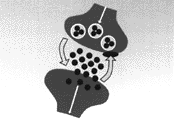
Wings of Sadness

What is depression?
Depression is an illness caused by an imbalance of the chemicals in the brain. It is not a sign of weakness, nor is the sufferer of depression 'going crazy'.
 |
 |
 |
| The Normal
Situation Serotonin (the small dots) moves between the two nerve cells, acting as a messenger. |
In
Depression There is not enough serotonin to act as an efficient messenger because the receptors are less sensitive. |
How
medication works By stopping some of the serotonin from being removed from the space, the levels build up to allow normal function. |
What are the signs and symptoms of depression?
Depression can present in many different forms and it may be quite difficult to diagnose without professional advice. You should not hesitate to discuss your concerns with your doctor, whether you recognise symptoms and signs in yourself, or in a friend or family member.
Two key symptoms:
A sad, anxious or empty mood that lasts 2 weeks or more and/or Loss of interest or pleasure in hobbies and activities that were once enjoyed, including sex Other symptoms:
Feelings of worthlessness, hopelessness, guilt Changes in sleep habits (insomnia, early-morning awakening, oversleeping) Loss of appetite and weight, or overeating and weight gain Fatigue, loss of energy, feeling "slowed down" or "can't be bothered" Difficulty concentrating, remembering, making decisions Irritability, hostility, nervousness Frequent thoughts of death or suicide, or suicide attempts Increased use of alcohol or drugs Persistent physical symptoms that don't respond to treatment - headaches Deterioration of social relationships Anxiety - agitation, restlessness, palpitations and other physical symptoms
Depression and anxiety
Figures show that between 60 and 90% of people with depression also have symptoms of anxiety. The combination is well-recognised and can significantly increase the disability and disruption of normal function suffered by the patient.
The anxiety associated with depression can take many forms including panic attacks, obsessive compulsive disorder, posttraumatic stress disorder, social anxiety disorder or a generalised anxiety disorder.
Fortunately medication is available which can effectively relieve both depression and anxiety.
If symptoms of depression and anxiety are a problem to you, you should discuss them with your doctor. Appropriate treatment can then be prescribed.
The chemical changes in depression
The brain is made up of cells which need various chemicals in order to function properly.
Serotonin is a very important transmitter in depression, but other transmitters called nor-adrenaline and dopamine are also involved. Transmitters act as
messengers, and are involved in passing impulses from one nerve cell to the next. In depression, there is "poor transmission" of messages between the cells because the receptors where these chemicals work have become less sensitive to them. Higher levels of these chemicals are needed in order to restore the effective transmission of impulses.
What causes depression?
Exactly what causes the changes in the receptor system, resulting in depression, is not always clear. In some cases, depression can follow a stressful life event such as the sudden loss of a loved one, financial hardship, or retrenchment. Often the cause is genetic, with other relatives suffering from depression or anxiety. However, in by far the majority of cases no obvious reason can be identified for why the depression started.
In some people, the illness pattern may leave them feeling constantly depressed. In others, symptoms may fluctuate so that periods of depression are followed by times when they feel quite well, only to become depressed again.
Whatever the reason for the illness, two important facts have been established:
Depression is a clearly identified chemical/ physical/ biological illness Depression can be effectively treated
Treatment for depression
The medication used in the treatment of depression is aimed at raising the levels of serotonin and other chemicals in the brain. Higher levels overcome the decreased sensitivity of the receptors. It usually takes some weeks for the chemicals to rise to effective levels, but as they do, the symptoms of the depression are relieved. Medication is continued for a period of 6-12 months before it is tapered off and then stopped. It is important that you do not stop the medication without talking to your doctor or pharmacist.
How frequent a problem is depression?
It is estimated that 1 in 5 people of all races, age and gender suffer from some form of depression during their lifetime.
In America, over 17 million people are being successfully treated for depression. However, it is estimated that there are probably more than twice this number of people in America, who are suffering from depression but who are not receiving any treatment. The reason for this lies in the fact that many people find it difficult to talk about their problems, and thus do not seek medical attention. The unfortunate perception by many that depression is a form of mental instability - something to be ashamed of - does not help.
Who gets depression?
Depression can occur at any age, from childhood to the elderly. Whatever the age, the underlying cause remains the same.
What is important to realise, is that depression is an illness which can affect people of any race, age or gender.
It cannot be stressed enough that depression is an ordinary illness which should never be ignored. Once depression is diagnosed, it can - and should - be treated by a doctor, just as other illnesses associated with chemical imbalances such as high blood pressure and diabetes are also treated by a doctor.